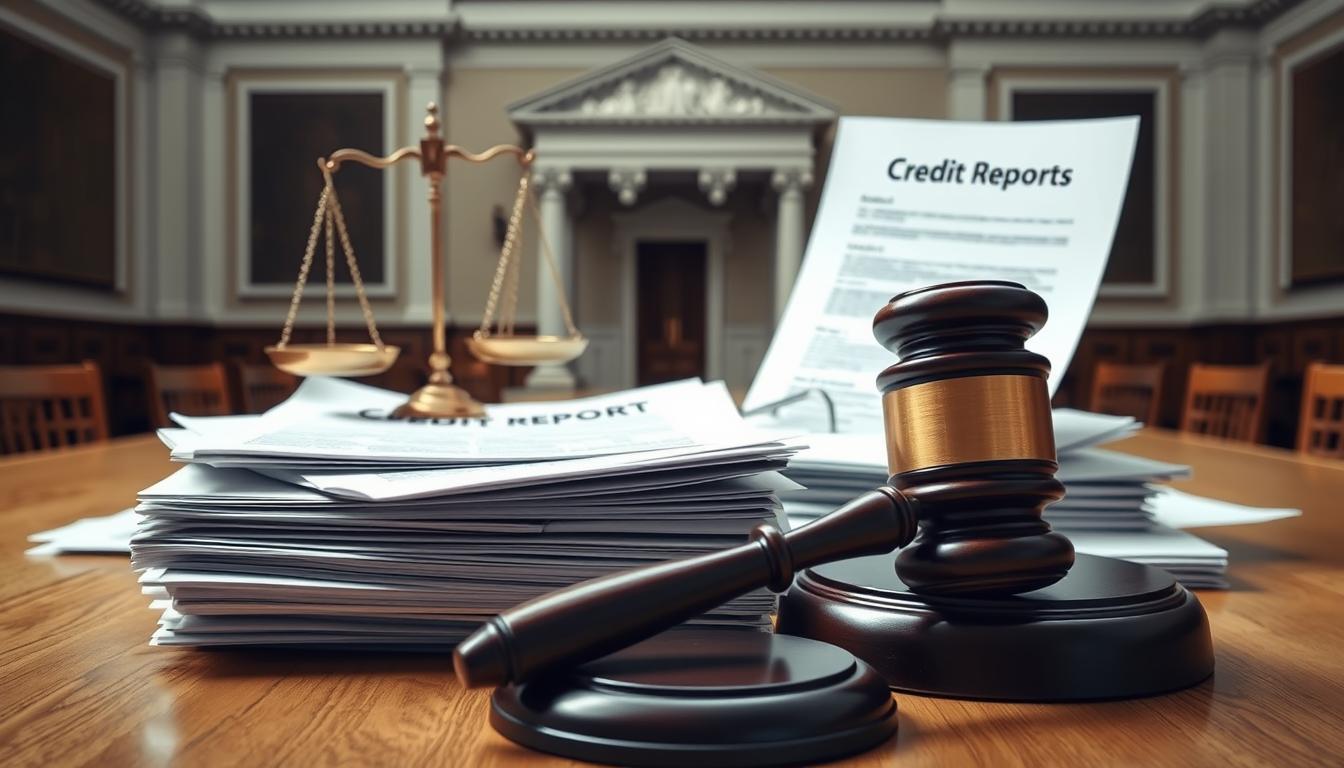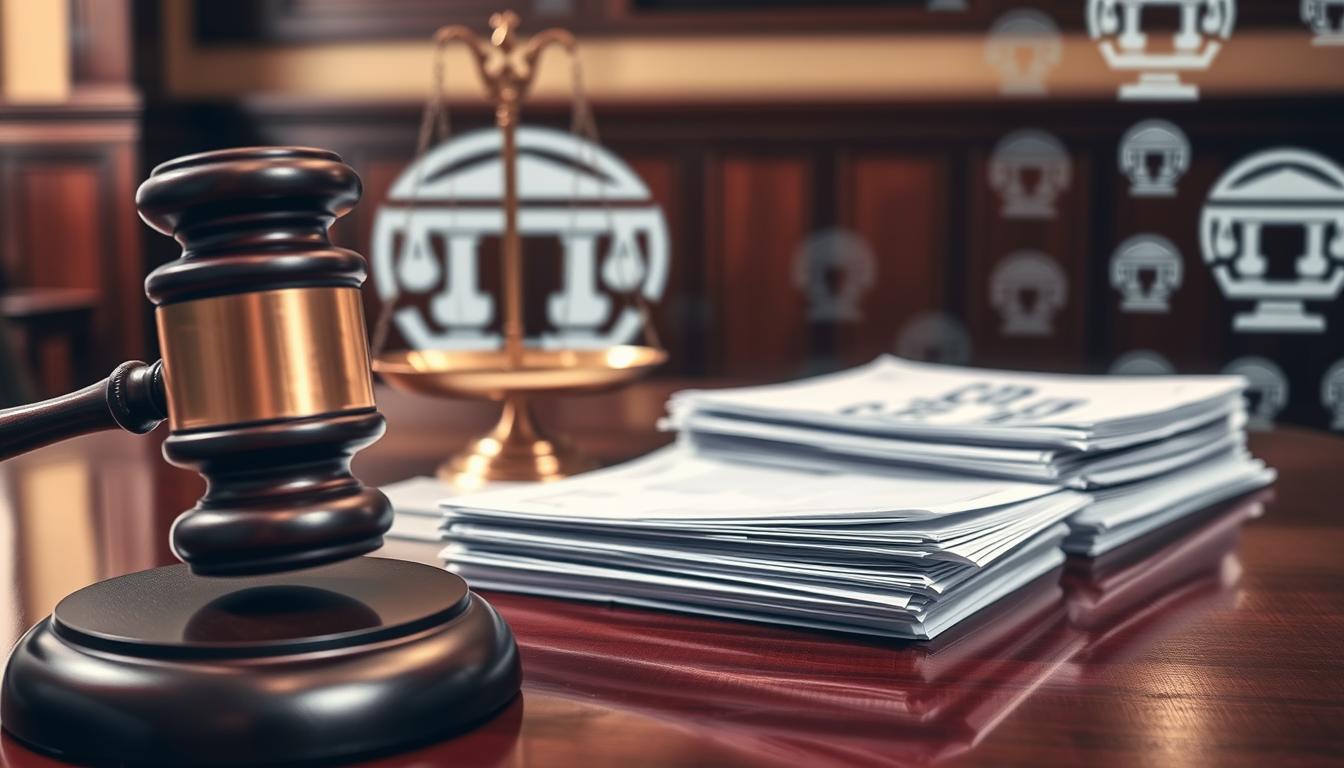Credit reports shape our financial future. They impact our ability to get loans, rent homes, and secure jobs. However, credit bureaus aren’t perfect. Errors in these reports can have serious consequences for consumers.
Legal action may be necessary if you face credit report problems. This guide will help you navigate credit disputes and sue credit bureaus. We’ll cover your rights under the Fair Credit Reporting Act (FCRA).
You’ll learn how to gather evidence and choose the right attorney. These steps are crucial to protect your financial well-being.
Key Takeaways
- The credit reporting agencies, Experian, Equifax, and TransUnion, play a crucial role in the credit ecosystem and can significantly impact your financial wellbeing.
- Inaccurate credit reports can lead to a range of issues, including denied loans, higher interest rates, and even job rejections.
- The Fair Credit Reporting Act (FCRA) provides consumers with legal rights and protections against credit bureau errors and negligence.
- Suing the credit bureaus can result in actual, statutory, and punitive damages, depending on the severity of the violations.
- Protecting your credit and identity through regular monitoring and prompt dispute resolution is key to preventing future credit report issues.
Understanding Credit Reporting Agencies
Credit reporting agencies are key players in personal finance. They keep track of our credit history and financial information. Experian, Equifax, and TransUnion are the main agencies that shape our financial future.
The Big Three: Experian, Equifax, and TransUnion
Experian, Equifax, and TransUnion are the top credit reporting agencies. They collect data from credit card companies, lenders, and public records. These agencies create detailed credit profiles for individuals.
Each agency has its own database and methods. This can lead to differences in the information they report. It’s important to check your credit reports from all three agencies regularly.
Their Role in the Credit Ecosystem
- Credit reporting agencies provide vital information to lenders, landlords, and employers. This helps them make decisions about a person’s creditworthiness.
- Lenders use credit reports and scores to assess risk when approving loans or setting interest rates.
- Landlords may check credit reports to evaluate potential tenants’ ability to pay rent on time.
- Employers might review credit reports during hiring to gauge financial responsibility and decision-making skills.
Knowing how credit reporting agencies work is essential for maintaining a good credit profile. It helps you access better financial opportunities. Understanding their role can improve your overall financial health.
Common Reasons for Suing Credit Bureaus
Inaccurate credit report information often drives consumers to sue credit bureaus. The Fair Credit Reporting Act (FCRA) safeguards individuals’ rights. Understanding these protections is vital when challenging errors on your credit report.
Inaccurate Credit Reports
Credit report errors can lead to higher loan interest rates. They may also result in denied job opportunities. Common mistakes include incorrect personal details and fraudulent accounts.
Other errors involve wrong account statuses or incorrect credit limits. Duplicate accounts or tradelines can also appear on reports.
- Incorrect personal information, such as name, address, or Social Security number
- Accounts that do not belong to the consumer, including fraudulent or closed accounts
- Incorrect account status, such as reporting an account as delinquent when it is in good standing
- Incorrect credit limit or balance information
- Duplicate accounts or tradelines
You have the right to dispute any inaccuracies on your credit report. The FCRA requires credit bureaus to investigate and fix verified errors promptly.

Credit bureaus may face legal action if they fail to properly investigate errors. Consumers might receive compensation for actual, statutory, or punitive damages. This applies in cases of willful FCRA noncompliance.
The Fair Credit Reporting Act (FCRA)
The Fair Credit Reporting Act (FCRA) is a federal law that protects consumer credit information. It gives you important rights over your credit reports. This law helps you stay in control of your financial data.
The FCRA lets you get free credit reports once a year. You can get these from Experian, Equifax, and TransUnion. This helps you check your credit and spot any mistakes.
Credit bureaus must fix errors on your report for free. This right keeps your credit information accurate. A correct credit report is key to a healthy financial life.
| Key Provisions of the FCRA |
|---|
|
Knowing your rights under the fair credit reporting act is crucial. It helps you protect your consumer rights and handle credit disputes. This knowledge guides you through the complex world of credit reporting.
Preparing to Sue the Credit Bureaus
Suing credit bureaus requires thorough preparation. Gather all necessary evidence to build a strong case. This includes credit reports, correspondence, and records related to the dispute process.
Gathering Evidence and Documentation
Review your credit reports for errors or inaccuracies. Identify specific items you believe are incorrect. Collect supporting documentation to strengthen your case.
Essential evidence includes:
- Copies of your credit reports
- Correspondence with the credit bureaus regarding the disputed items
- Proof of identity theft or unauthorized accounts
- Receipts, statements, or other documents that contradict the information on your credit report
This evidence shows the validity of your claims. It also demonstrates the credit bureaus’ failure to properly investigate and resolve issues.
Hiring an Attorney Specializing in Credit Disputes
Suing a credit bureau can be complex. Hire an attorney who specializes in credit dispute resolution. They have extensive knowledge of the Fair Credit Reporting Act (FCRA) and other relevant laws.
Choose an attorney with a proven track record in credit dispute cases. They should guide you through evidence gathering, lawsuit filing, and court representation.

suing the credit bureaus
Credit report issues can be frustrating. Inaccurate information or unresolved disputes may lead you to consider legal action. Suing credit bureaus is complex, but knowing the steps can help you navigate the process.
The Fair Credit Reporting Act (FCRA) is a key legal basis for suing credit bureaus. It requires them to ensure accurate and complete information in consumer credit files. If they fail to investigate and correct errors promptly, you may have grounds for a lawsuit.
- Gather evidence: Collect all documentation related to your credit report issues, including correspondence with the credit bureaus, payment records, and any evidence of financial harm.
- File a dispute: Before initiating a lawsuit, you must first attempt to resolve the issue directly with the credit bureaus by filing a dispute. This is a crucial step in establishing your case.
- Hire an attorney: Consider working with a lawyer who specializes in credit disputes and FCRA violations. They can help you navigate the legal process and increase your chances of a favorable outcome.
- File a lawsuit: If the credit bureaus fail to address your concerns, you can file a lawsuit in federal court. This may involve proving that the bureaus failed to conduct a reasonable investigation or that their actions resulted in actual damages.
Suing credit bureaus can be challenging but necessary to resolve credit report issues. Understanding your FCRA rights is crucial. Taking proper legal actions can help correct inaccuracies and seek compensation for harm caused by negligence.
Potential Damages and Compensation
Suing credit bureaus can lead to various types of compensation. Knowing these categories can help you build a stronger case. It can also maximize your potential recovery.
Actual Damages
Actual damages are quantifiable monetary losses due to credit bureau negligence. These can include costs of repairing credit or lost job opportunities. To claim actual damages, you must provide evidence of these financial losses.
Statutory Damages
The Fair Credit Reporting Act (FCRA) allows for statutory damages. These are set amounts not tied to your actual losses. If a credit bureau willfully violated the FCRA, you may receive $100 to $1,000.
Punitive Damages
Punitive damages may be sought for egregious or malicious actions by credit bureaus. These aim to punish the bureau and prevent future misconduct. Punitive damages are harder to obtain.
You must prove the credit bureau’s conduct was willful, reckless, or intentionally harmful. Understanding potential damages can be challenging. With proper legal guidance, you can increase your chances of fair compensation.

Credit Bureau Errors and Negligence
Credit bureaus greatly impact our finances. Their mistakes can cause serious problems for consumers. These errors can lead to loan rejections and higher interest rates.
Credit bureau errors happen when agencies record wrong information. This can occur due to clerical mistakes or identity theft. Credit bureau negligence involves failing to investigate disputes properly.
Common issues include:
- Inaccurate personal information, such as incorrect name, address, or Social Security number
- Erroneous account information, including closed accounts still being reported as open or incorrect balance and payment history
- Duplicate accounts or accounts that belong to someone else
- Failure to remove information that should have been deleted, such as paid-off debts or accounts that are past the statute of limitations
Quick action is key when dealing with credit bureau errors. Dispute inaccuracies with credit bureaus right away. Provide supporting documents and seek legal help if needed.
Be proactive to protect your credit profile. This ensures you’re not unfairly penalized for credit bureaus’ mistakes.
| Common Credit Bureau Errors | Potential Consequences |
|---|---|
| Inaccurate personal information | Difficulty obtaining credit, employment, or housing |
| Erroneous account information | Higher interest rates or loan denials |
| Duplicate accounts or accounts belonging to someone else | Inflated credit utilization and lower credit scores |
| Failure to remove deleted information | Continued negative impact on credit profile |
Understanding credit bureau errors and credit bureau negligence helps protect your financial health. Address issues quickly for accurate credit reporting. This leads to better financial opportunities and peace of mind.
Identity Theft and Credit Bureau Liability
Identity theft can wreak havoc on your finances. Stolen personal info leads to fake accounts and damaged credit. Credit agencies play a key role in protecting consumer data.
Protecting Your Credit After Identity Theft
Quick action is crucial if you’re a victim of identity theft. Here are steps to safeguard your credit and restore your finances:
- Contact the credit bureaus and request a fraud alert or credit freeze on your credit file. This will make it more difficult for the thief to open new accounts in your name.
- Carefully review your credit reports from all three agencies, looking for any unauthorized activity. Dispute any errors or fraudulent items with the respective credit bureau.
- File an identity theft report with the Federal Trade Commission (FTC) and obtain a copy of your identity theft affidavit. This document can help you navigate the credit repair process.
- Monitor your credit reports and bank statements regularly to detect any further attempts at identity theft or unauthorized transactions.
Credit bureaus must investigate and resolve disputes about identity theft. They also handle inaccurate info on credit reports. By taking action, you can protect your credit protection.
You can also minimize the long-term impact of identity theft. Hold the agencies accountable for their responsibilities.
| Credit Bureau | Contact Information | Dispute Process |
|---|---|---|
| Experian | 1-888-397-3742 | www.experian.com/disputes |
| Equifax | 1-800-685-1111 | www.equifax.com/personal/credit-report-services |
| TransUnion | 1-800-916-8800 | www.transunion.com/credit-disputes |
Credit bureau liability goes beyond providing accurate reports. They must protect consumer info and respond quickly to theft-related disputes. Know your rights to shield your credit from threats.
Alternative Dispute Resolution Methods
Credit disputes can be costly and time-consuming in court. Alternative dispute resolution (ADR) offers a quicker way to solve credit issues. Mediation and arbitration are two methods that can help resolve disputes outside of court.
Mediation: A Collaborative Approach
Mediation involves a neutral third party helping both sides reach an agreement. This method allows for creative solutions and faster resolutions. The mediator guides communication to find a solution that works for everyone.
Arbitration: A Binding Decision
In arbitration, an impartial arbitrator hears both sides and makes a binding decision. This process is more formal than mediation. Both parties present evidence and arguments. The arbitrator’s decision is legally enforceable, resolving the credit dispute.
Choosing between mediation and arbitration depends on the case and parties involved. Both methods offer alternatives to traditional litigation. These options provide more flexibility for addressing credit-related concerns.
“The best way to resolve a credit dispute is often through open communication and a willingness to compromise. Alternative dispute resolution methods can help facilitate that process.”
Preventing Future Credit Report Errors
Your financial health depends on accurate credit reports. Regularly check reports from Experian, Equifax, and TransUnion. This helps you spot and fix issues quickly.
Monitoring Your Credit Reports Regularly
Check your credit reports at least once a year. You can get free reports from AnnualCreditReport.com. This website is authorized by federal law.
Look for errors in account info, payment history, or unauthorized inquiries. Dispute any mistakes with credit bureaus right away. Provide supporting documents when needed.
Consider using a credit monitoring service. It can alert you to changes and help you stay vigilant.
- Review your credit reports for any inaccuracies, such as incorrect account information, incorrect payment history, or unauthorized inquiries.
- Dispute any errors you find with the credit bureaus promptly, providing supporting documentation as needed.
- Consider enrolling in a credit monitoring service, which can alert you to changes in your credit profile and help you stay vigilant.
By preventing credit report errors and monitoring your credit reports, you protect your financial well-being. Take charge of your credit information today.

“Regularly checking your credit reports is one of the best ways to prevent future credit report errors and maintain the integrity of your credit history.”
Conclusion
Suing credit bureaus can effectively address inaccurate reports and identity theft issues. The Fair Credit Reporting Act protects your rights. Quick action holds agencies accountable and safeguards your financial health.
Understanding the legal process is crucial when dealing with credit report errors. An experienced attorney can guide you through gathering evidence and filing disputes. Their help is invaluable if legal action becomes necessary.
Regular credit monitoring helps prevent future report problems. Stay informed about your rights as a consumer. Don’t hesitate to seek professional help with credit disputes.
By taking these steps, we can promote a more transparent credit reporting system. This benefits all consumers and improves financial fairness for everyone.
FAQ
What are the common reasons for suing credit bureaus?
What rights do consumers have under the Fair Credit Reporting Act (FCRA)?
How can consumers prepare to sue the credit bureaus?
What types of damages can consumers seek in a lawsuit against the credit bureaus?
FAQ
What are the common reasons for suing credit bureaus?
People sue credit bureaus for inaccurate reports, failure to investigate disputes, and FCRA violations. Legal action may be taken for including wrong information or mishandling personal credit data. Credit bureaus can be held accountable for not correcting errors in reports.
What rights do consumers have under the Fair Credit Reporting Act (FCRA)?
The FCRA gives consumers the right to access credit reports and dispute incorrect information. It requires credit bureaus to ensure accuracy and security of collected data. Consumers can also receive notice of adverse actions based on their reports.
How can consumers prepare to sue the credit bureaus?
To prepare for a lawsuit, gather all relevant evidence like credit reports and dispute letters. Hire an attorney who specializes in credit dispute resolution and consumer protection laws. Keep all correspondence with credit bureaus for your case.
What types of damages can consumers seek in a lawsuit against the credit bureaus?
Consumers can seek actual damages for financial harm or lost opportunities. Statutory damages up to
FAQ
What are the common reasons for suing credit bureaus?
People sue credit bureaus for inaccurate reports, failure to investigate disputes, and FCRA violations. Legal action may be taken for including wrong information or mishandling personal credit data. Credit bureaus can be held accountable for not correcting errors in reports.
What rights do consumers have under the Fair Credit Reporting Act (FCRA)?
The FCRA gives consumers the right to access credit reports and dispute incorrect information. It requires credit bureaus to ensure accuracy and security of collected data. Consumers can also receive notice of adverse actions based on their reports.
How can consumers prepare to sue the credit bureaus?
To prepare for a lawsuit, gather all relevant evidence like credit reports and dispute letters. Hire an attorney who specializes in credit dispute resolution and consumer protection laws. Keep all correspondence with credit bureaus for your case.
What types of damages can consumers seek in a lawsuit against the credit bureaus?
Consumers can seek actual damages for financial harm or lost opportunities. Statutory damages up to $1,000 per FCRA violation are possible. In cases of willful noncompliance, punitive damages may be awarded.
How can consumers protect their credit after experiencing identity theft?
After identity theft, contact credit bureaus to dispute fraudulent information. Place a fraud alert or credit freeze on your reports. Monitor your credit closely for unauthorized activity. Credit bureaus may be held liable for failing to protect personal information.
What are some alternative dispute resolution methods for resolving credit disputes?
Mediation and arbitration are alternative methods for resolving credit disputes. These approaches can be faster and more cost-effective than lawsuits. However, they may have certain limitations compared to traditional legal processes.
How can consumers prevent future credit report errors?
Regularly monitor credit reports from all three major bureaus. Report discrepancies promptly and keep detailed records of your credit history. Use credit monitoring services and identity theft protection to safeguard your information.
,000 per FCRA violation are possible. In cases of willful noncompliance, punitive damages may be awarded.
How can consumers protect their credit after experiencing identity theft?
After identity theft, contact credit bureaus to dispute fraudulent information. Place a fraud alert or credit freeze on your reports. Monitor your credit closely for unauthorized activity. Credit bureaus may be held liable for failing to protect personal information.
What are some alternative dispute resolution methods for resolving credit disputes?
Mediation and arbitration are alternative methods for resolving credit disputes. These approaches can be faster and more cost-effective than lawsuits. However, they may have certain limitations compared to traditional legal processes.
How can consumers prevent future credit report errors?
Regularly monitor credit reports from all three major bureaus. Report discrepancies promptly and keep detailed records of your credit history. Use credit monitoring services and identity theft protection to safeguard your information.

